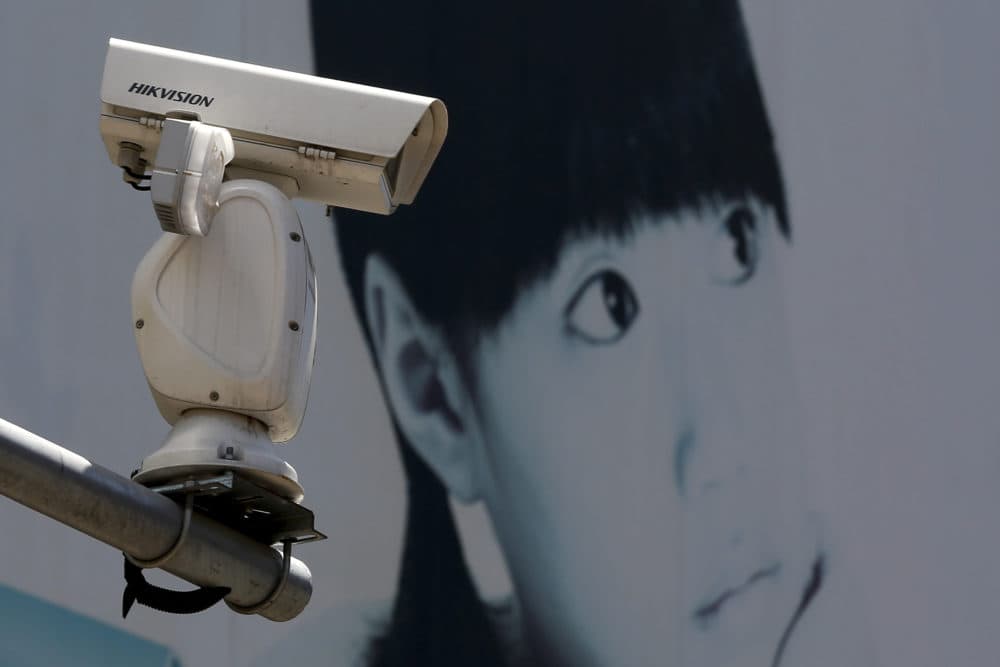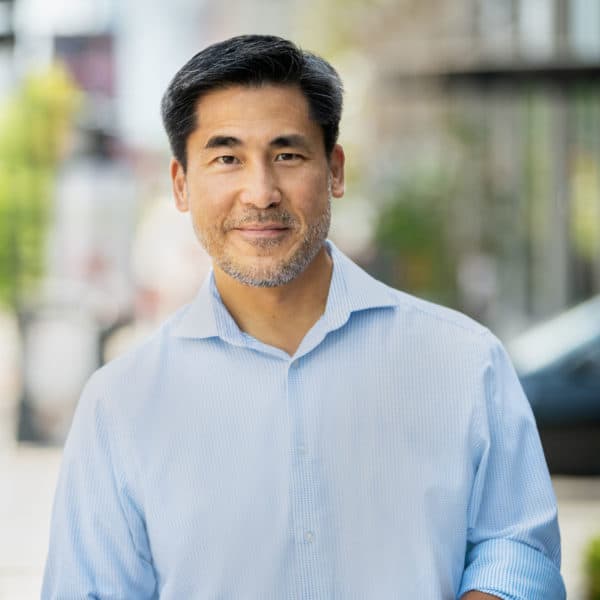Advertisement
'The Perfect Police State' paints a picture of the surveillance China uses to monitor Uyghurs
Resume
This segment was rebroadcast on Nov. 26, 2021. Find that audio here.
Have you ever seen the movie “Minority Report?”
The film is about a special police force in the future that does what’s called “preventive policing,” using psychics and technology to predict who will commit a crime.
China appears to have developed a version of this, according to investigative reporter Geoffrey Cain. In his new book “The Perfect Police State: An Undercover Odyssey Into China's terrifying Surveillance Dystopia of the Future,” he tells the story of China’s vast surveillance system used against ethnic minority Muslims in the western part of the country.
Cain begins the book with the phrase that the targets of the surveillance call “the situation.” He says “the situation” is how people from the Uyghur ethnic group describe their life without having to reveal too much in front of the authorities.
“If you're living under the situation, what that means is that your entire life is surveilled 24/7 by the state, nonstop by cameras, by artificial intelligence, by a predictive policing system that predicts whether or not you'll commit a crime in the future,” Cain says.
The mass database is called the IJOP — the Integrated Joint Operations Platform — which is a police platform that nudges officers when it believes someone is prone to committing an act of terror. The person is then visited by the police, interrogated and in some cases taken to concentration camps.
The Chinese government has been sending out government-appointed minders whose job is to live in the house with families for days on end, Cain explains, and quiz the family on party ideology.
“Let's say if you're a woman and your husband has been taken away to a concentration camp,” Cain says, “you might actually wake up next to a man, a government minder who was sent there to watch over your family.”
Interview Highlights
On Kashgar, one of the big cities in Western China where many Uyghur Muslims live
“There were a series of terrorist attacks back in the early 2010s — about 10 years ago now — and also protests in 2009 that signified to the Chinese government that there is discontent in this region. There were people who were traveling to Syria, traveling to Afghanistan to study jihad and to potentially become terrorists. But instead of picking out those enemies among a vast population in this region, the Chinese government decided to respond with a dragnet approach.
“I've been to the region many times over the years and on my most recent visit — which was December 2017 — I could feel just the terror emanating from regular people. It was as if you look at them and it's like their identities are blank and they don't want to show any emotion and they're keeping their heads down and kind of walking around the city quickly. So nobody stops them and nobody asks for their documents or their ID card. It truly is a place where everyone knows that they're being watched and they're just not sure when or where by these AI cameras.”
On the main character of the book — a young woman by the pseudonym “Maysem” — who goes to school abroad in Turkey and finds herself in this machine that spies on the Uyghurs
“One of the things about the Uyghurs in China is that if they travel overseas, or say if they take on interests that are intellectual or say they're reading banned literature such as the Quran — they become deeply suspicious in the eyes of the government. And so Maysem was in Turkey finishing her master's degree and she would return home every summer. She was actually from a very well-to-do and even elite family in China even though they were from the Uyghur group. But the system, as she went home every summer to see her family, just began turning against her.
“She was finally called to ... a re-education center, but it's a concentration camp. And at first she was going to do daily lessons six hours a day and she would be allowed to go home — but she was reassigned again to an even higher level security concentration camp called the detention center. And she was forced to undergo just bizarre, nonsensical rituals that were designed to psychologically torture her and even physically sometimes torture her … and she realized quickly what this system was designed to do — it was a mass attempt to erase the heritage and the culture and the identity of an entire people.”
On how the technology that is being used has grown over the years, whether that is recognizing voices or faces
“It's a mixture of AI and facial and voice recognition … also mass data gathering through smartphones, through the WeChat app in particular. The thing about the technology is that it is new and novel, but I also found in my own reporting, that even though the technology gives the impression that it's extremely sophisticated, it's actually not that sophisticated. Once you look under the hood — because all it's doing is just a dragnet — it's not really a sophisticated, tinkered approach to targeting certain people or targeting certain places. It gathers mass data on what every single person is doing and then it finds correlations that don't really make sense to humans.”
On the Chinese and U.S. companies that are developing this technology and how closely they are connected to the Communist Party
“There are two groups of companies that have been involved in creating this surveillance data in Xinjiang. And the first are Chinese firms that under Chinese law they are essentially required to do what the Communist Party wants if there's some kind of investigation or national security matter. These are Chinese companies but just to make clear they are major global multinational firms that are exporting facial recognition and voice recognition. A lot of the similar technologies that have been deployed in Xinjiang are now being sold to governments and police departments in places like sub-Saharan Africa, Uganda, Kenya, also Central Asia, Uzbekistan.
"So these are regimes that can be authoritarian and that are deploying them to spy on the opposition and whatnot. It truly is a scary development that China is exporting this technology. But we can't just blame Chinese companies because American firms to Silicon Valley firms — they were deeply involved in creating a lot of the Chinese surveillance state, you know, American firms into deals to supply the semiconductor chips for Chinese AI.”
On the process of reporting this book across Asia and many authoritarian places in the middle of this system
“It was very difficult. Whenever I went to Xinjiang I would bump up against this surveillance state and they know how to find you and get you out quickly if they don't like what you're doing there. So I was able to report mainly through refugees. I spent three years in Turkey where most legal refugees have gone and resettled. It was the Uyghurs who very heroically came forward with stories, fully knowing … they could be at risk or their families could be at risk. They really wanted to make sure that the world would know about this.”
Julia Corcoran produced and edited this interview for broadcastwith Jill Ryan. Camila Beiner adapted it for the web.
Book Excerpt: "The Perfect Police State: An Undercover Odyssey Into China's terrifying Surveillance Dystopia of the Future"
By Geoffrey Cain
1
PROLOGUE
The Situation
In the region of Xinjiang in western China, people call their dystopia “the Situation.”
Since 2017, an estimated 1.8 million Uyghurs, Kazakhs, and people from other primarily Muslim minorities have been accused by the government of harboring “ideological viruses” and “terrorist thoughts,” and taken away to hundreds of concentration camps. Many of the camps were repurposed high schools and other buildings, turned into detention centers for torture, brainwashing, and indoctrination. It is the largest internment of ethnic minorities since the Holocaust.
Even if you don’t end up in a camp, daily life is hellish. If you’re a woman, you might wake up every morning next to a stranger appointed by the government to replace your partner whom the police “disappeared” to a camp. Every morning before work, this minder will teach your family the state virtues of loyalty, ideological purity, and harmonious relations with the Communist Party. He’ll check on your progress by asking you questions, ensuring you haven’t been “infected” with what the government calls the “viruses of the mind” and the “three evils”: terrorism, separatism, and extremism.

After your morning indoctrination, you may hear a knock on the door. The local neighborhood watch official, appointed by the state to keep an eye on a block of ten homes, will check your house for “irregularities,” such as having more than three children or owning religious books. She may ask why you were late for work yesterday.
She’ll probably say that “the neighbors reported you.”
For the crime of forgetting to set the alarm, you must now report to the local police station for an interrogation, where you must explain the irregularity.
After her daily inspection, the neighborhood watch official scans a card against a device hoisted on your door. It indicates she has completed her survey.
Before work, if you drive to the gas station or the grocery store to grab something for dinner, at each place you go you scan your ID card at the entrance, in front of armed guards. After you scan it, a display next to the scanner shows the word “trustworthy,” meaning the government has declared you a good citizen, and you’ll be permitted entry.
A person who receives the notification “untrustworthy” is denied entry, and after a quick check of his statistical data records may face further problems. Maybe the facial recognition cameras caught him praying in a mosque. Or the cameras recorded him buying a six-pack of beer and the artificial intelligence (AI) suspects he has an alcohol problem. He may never know the reason. But everyone knows that any little hiccup can cause the state to lower your trustworthy ranking.
Police officers approach and question him. They double-check his identity on their smartphones with a program called the Integrated Joint Operations Platform, which consists of mass data the government has gathered on every citizen using millions of cameras, court records, and citizen spies, all of it processed by AI.
Under the “predictive policing program,” the AI determines he will commit a crime in the future and recommends sending him to a camp. The police officers concur. They take him away in their police car. He may return at some point after a period of “reeducation,” or he may never be seen again.
After standing in a segregated checkout line for minorities, you pay for your groceries. Government cameras and your WeChat messaging app monitor your purchases. You exit the grocery store and drive to work. On the way you pass a dozen police checkpoints, called “convenience police stations.” Convenient for whom? At two checkpoints the police stop you, demand to see your identification documents, and ask where you’re headed. Satisfied, they whisk you through, but only because you’re “trustworthy.”
More from WBUR
At the office, your coworkers watch you constantly. Before the day starts, you all stand and sing the national anthem, then watch a short propaganda film on how to spot a terrorist. It explains that a terrorist “is likely to stop smoking and drinking, doing so suddenly.” You want to laugh. But your colleagues might report such disrespectful behavior, hoping for a reward from the government or a stronger trust ranking. You stay quiet throughout the film.
At noon each day, if you’re female, you’re required to take a government-mandated birth control pill. Still, you are one of the lucky ones: the government frequently summons female coworkers to a local clinic for mandatory sterilization. The government says it wants to cut down on minority birth rates, claiming lower birth rates will lead to prosperity.
After work is finished, you drive home, pass another dozen police checkpoints, and then scan your ID card to pass through the gate at the entrance of your neighborhood, a ghetto surrounded by a fence or concrete wall, where no one can enter or leave without scanning their card. At home, your children tell you about the party virtues of patriotism and harmony they learned that day in school. You don’t debate their lessons. The teacher told the students to report parents who didn’t agree with them.
After eating dinner and watching the evening news, in front of a government camera installed in the corner of the living room, you lie down in bed with your government minder. Hopefully, you can fall asleep. You remember that he has the power to do whatever he wants here in bed, because he was sent by the state. If you resist his advances, he’ll invent an allegation and report you, and you’ll be sent to the camps.
Luckily, tonight you’re okay. But your luck might not last. You fall asleep, then repeat your routine the next morning. This is a day in the life of a Uyghur, Kazakh, or other ethnic minority in Xinjiang.
Excerpted from THE PERFECT POLICE STATE: An Undercover Odyssey into China's Terrifying Surveillance Dystopia of the Future by Geoffrey Cain. Copyright © 2021. Available from PublicAffairs, an imprint of Hachette Book Group, Inc.
This segment aired on August 9, 2021.
